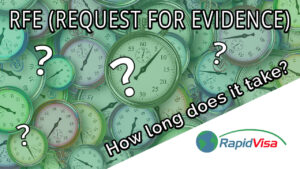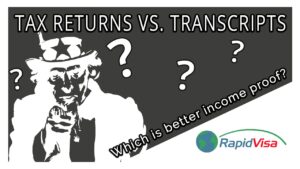Receiving a request for evidence (RFE) can be a very stressful part of the visa process. Typically, RapidVisa sees more RFEs at the adjustment of status phase than any other step of the immigration process.
Most RFEs for AOS petitions are related to the financial ability of the sponsor to support the applicant. U.S. authorities want to know that the sponsor can support you financially and believe you won’t become a “public charge”. Here are some common reasons for adjustment of status RFEs we see:
1. Sponsor Doesn’t Meet or Barely Meets the Income Requirement
You need to make sure that your sponsor not only meets the income requirement but can solidly prove it. Your evidence should be strong and irrefutable. If you’re trying to meet the minimum, this could be an issue for your application.
2. Sponsor Doesn’t File Tax Returns
If a sponsor didn’t file their federal tax returns for the most recent year, they need to file or prove they are not required to file. The sponsor must provide returns for the last 3 years in most cases. In some cases, your sponsor might not be required to file taxes, but an RFE will be sent if they don’t include an explanation or evidence to prove this is the case. You should provide tax returns, or even better, tax transcripts, even if you were recently hired.
3. Sponsor’s Tax Returns of Last 3 Years Indicate Unsustainable Income
If your sponsor has an intermittent work history, or their income fluctuates, it could indicate that the income is unsustainable. This could cause an RFE.
4. Sponsor Over-Deducted on Taxes
Self-employed individuals and independent contractors commonly deduct more items than the typical taxpayer to avoid a high tax bill. Such deductions may be 100% legitimate, but historically draw more scrutiny and can cause RFEs to occur.
5. Sponsor Doesn’t Provide 1099s
This is mainly for people who are on social security benefits, retired, or disabled. Sometimes these kinds of income are not taxable, but the sponsor must still provide 1099s.
6. Workers' Compensation
If a sponsor is on workers’ compensation, their income is viewed as unsustainable by USCIS. This can draw an RFE or denial.
7. Providing Weak Assets in Lieu of Income
The types of assets that are more easily approved are liquid. The more liquid, the better. Vehicles and properties are more scrutinized. IRAs, cash in bank accounts, stocks, and bonds are the safest bet. Remember if using assets in lieu of income, you can only use 1/3 of the assets.
For example, if your income requirement is $20,000, you must have at least $60,000 in assets to use in lieu of income if you are a U.S. citizen, or $100,000 if you’re a green card holder



